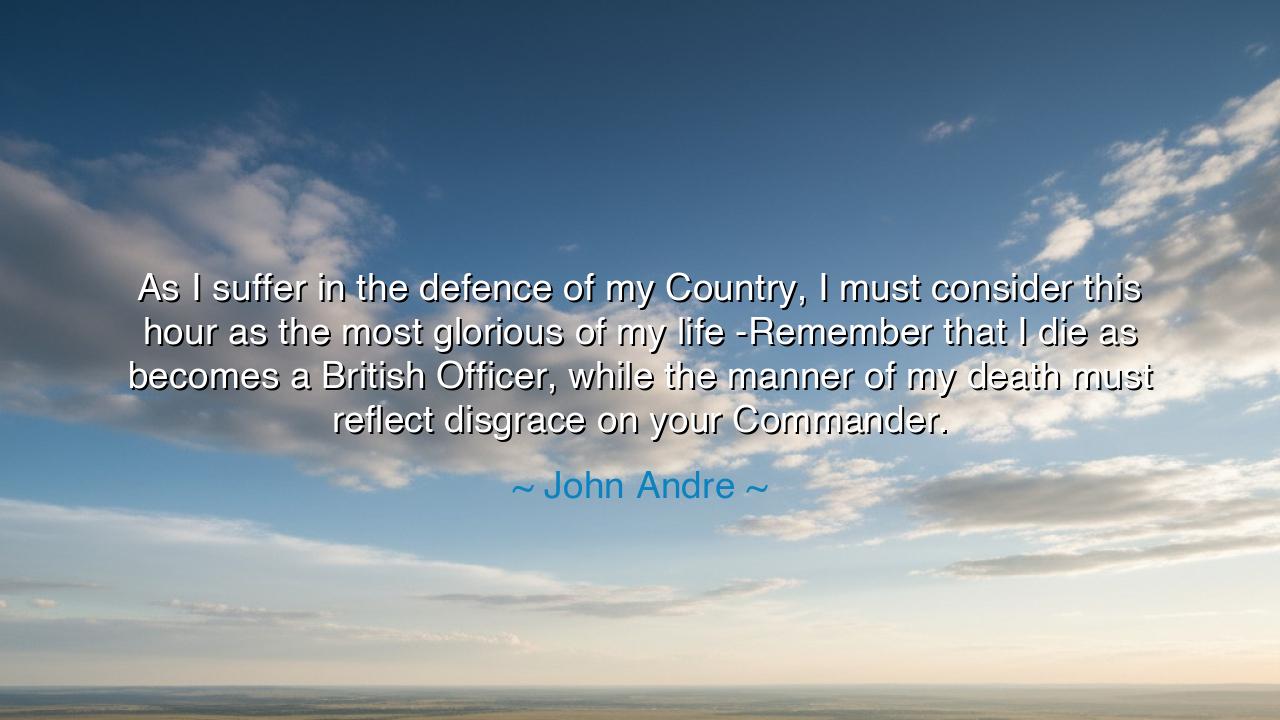
As I suffer in the defence of my Country, I must consider this
As I suffer in the defence of my Country, I must consider this hour as the most glorious of my life -Remember that I die as becomes a British Officer, while the manner of my death must reflect disgrace on your Commander.






"As I suffer in the defence of my Country, I must consider this hour as the most glorious of my life. Remember that I die as becomes a British Officer, while the manner of my death must reflect disgrace on your Commander." — thus spoke Major John André, on the eve of his execution in 1780 during the American Revolution. His words, carved in calm defiance and noble sorrow, are the utterance of a man who met death with honor, even in defeat. In them, we hear the voice of a soldier who clung not to life, but to duty, honor, and the eternal dignity of one’s conduct before the inevitable end.
The meaning of this quote rests upon the eternal contrast between glory and shame, between what a man endures and how he endures it. John André, though captured as a spy and sentenced to die by hanging, refused to let circumstance define his worth. His body was condemned, but his spirit remained sovereign. He spoke not with bitterness, but with serenity — as one who knew that the true measure of a person lies not in the outcome of their fate, but in the courage with which they face it. To suffer for one’s country and yet call it “the most glorious hour” is the height of self-mastery, the victory of soul over circumstance.
André’s story is bound to the treachery of Benedict Arnold, the American general who sought to betray his cause and deliver West Point to the British. André, acting as Arnold’s contact, was captured in disguise, carrying secret documents. Tried by court-martial, he was sentenced to death not as an officer, but as a spy — a fate deemed dishonorable by the codes of war. Yet André bore this humiliation with quiet valor. Even his enemies, including General George Washington, mourned his composure and grace. In dying, he showed that honor cannot be stripped by others — it can only be surrendered by oneself.
The origin of his words lies in that moment when a man stands between shame and eternity. He did not plead for mercy; he sought only to die in a manner befitting his station. He said, “I call upon you to bear witness that I meet my fate like a man.” And indeed, he did. The Americans, who hanged him, later wept at the dignity with which he faced the rope. His calmness transformed his execution into something transcendent — a scene not of disgrace, but of glory. In his death, André taught a lesson older than kings: that character is the final fortress of the soul.
There is a kindred spirit in the story of Socrates, who, condemned to drink hemlock for corrupting the youth of Athens, refused to flee or curse his accusers. Like André, he accepted his death as the crown of a life lived with purpose. He told his disciples, “No evil can happen to a good man.” In both men, we see the same truth — that when the body perishes, virtue remains untouched. Death, stripped of fear, becomes not an ending, but an unveiling of one’s true nature.
To live by André’s example is to remember that honor is not situational. It is not defined by victory or the applause of others, but by fidelity to one’s principles even when all else is lost. The soldier’s courage, the philosopher’s calm, the martyr’s faith — all arise from the same root: the recognition that life’s worth is measured not in its length, but in its integrity. Whether in battle, in work, or in the struggles of the soul, what matters is that we hold to our truth when the world turns against us.
Let this be your lesson, O reader: never let disgrace enter through your own hand. You cannot govern how the world treats you, but you can govern how you meet it. When hardship comes, face it with dignity. When others wrong you, answer not with bitterness but with strength. Live so that, if your final hour arrives in darkness, your words — like André’s — might still be filled with light.
For the manner of one’s death, like the manner of one’s life, is the final testament of the soul. And those who meet their end with courage transform their suffering into glory. So stand firm in all trials, live with honor, and die — when that hour must come — as one who has nothing to regret, and everything to be proud of.






AAdministratorAdministrator
Welcome, honored guests. Please leave a comment, we will respond soon